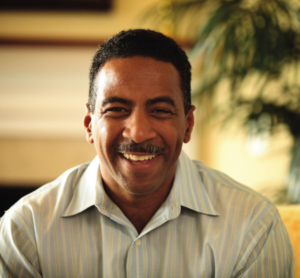How Inspirational Leaders Build Trust
Roland Warren, Care Net

Roland Warren remembers the first time he was called the racial slur we don’t use today. “I was 15, and in that moment, I had to decide how I was going to respond and what I was going to think about people.”
 Roland Warren, Care Net
Roland Warren, Care Net
Today, Roland is President and CEO of Care Net, a 501(c)3 nonprofit organization that empowers women and men considering abortion to choose life for their unborn children and find abundant life in Christ.
Roland recently detailed a biblical perspective on race with Care Net’s Chief Outreach Officer Vincent DiCaro, in a candid, on-camera interview. The Book of Joshua provides the context for his perspective on race. . . .
In the heat of unrest behind George Floyd’s death, I turned to the book of Joshua, a black man God chose to lead the Hebrew people out of 400 years of slavery. Just prior to leading God’s people into the Promised Land, Joshua looks up and sees a man and asks him, “Are you for me, or are you for my adversary?” The man (the pre-incarnate Christ) answers:
“No; but I am the commander of the army of the Lord. Now I have come. And Joshua fell on his face to the earth and worshiped and said to him, “What does my lord say to his servant?” 15 And the commander of the Lord's army said to Joshua, “Take off your sandals from your feet, for the place where you are standing is holy.” And Joshua did so (Joshua 5:14-15).
In the current swirl of racial tension, I hear people asking each other, "Are you on my side, or the side of my adversary?” I believe Joshua’s encounter with the pre-incarnate Christ is essentially asking all Christians, “Are you on God’s side? What does it mean to be on God’s side?"
If we look through Scripture, we know God is a God of justice. If we want to be on God’s side, we need to seek his Justice, a desire to make things right for the vulnerable, to bring justice against their perpetrators.
In the public square, we see a focus on, "No Justice, No Peace." That's important. If you're on God's side, it's more than this, because we know that our God is also a God of mercy. You can’t be on God’s side calling for justice if you’re not also calling for mercy.
A key aspect of mercy is forgiveness. As a black man, I need to seek justice, mercy, and forgiveness. I can't be on God's side and carry unforgiveness in my heart?
Personal reflection and repentance don't focus on one race. The reality is we've all sinned and fallen short of the glory of God. Since we have all sinned, then all of us of all races, need to make time for personal reflection, confession, and forgiveness. When you view this the way Christ did, we are all culpable and therefore we are all responsible to examine ourselves and repent.
To be on God's side is to be on the side of justice, mercy, forgiveness, and righteousness. Biblically, righteousness means being right in God's eyes in terms of our conduct, our character, and our conscience. God's call to righteousness is to black people, white people, brown people, all people.
God’s desire, fulfilled through the cross of Christ, is reconciliation between a holy God and human beings, as well as the restoration of all things. So, the biblical narrative is all about reconciliation and restoration. The cultural narrative being informed by the media and social media platforms like Facebook and Twitter is too often about revenge and retribution. These platforms are not designed for reconciliation.
When it comes to the racial issues facing our country, whether you are black, or white—whatever your skin color—are you solving for reconciliation? Remember, the biggest racist that has ever existed is Satan because he hates the human race and he wants us to be in conflict.
We’re called to be reconciled first to God and then to our fellow human beings and to have a ministry of reconciliation in all that we do as Christians.
Reconciliation means listening to and understanding another person’s story. I once listened to the story of an adult friend of mine, who is white. He told me about the day his parents dropped off him and his younger siblings at home and never came back. He was 16 at that time. So, he understands rejection and the pain of someone saying, “You’re not worthy of me being connected to you.”
When I heard my friend’s story, I found my own story, and we were reconciled and built a friendship. The ultimate story is God who came to earth in human form to connect with our story and reconcile us to him. Christ found our story that transcends race, creed, and national origin. He connected to our story, and that’s why we call him Savior.
Right now, people are unfriending one another over three words. One says to the other, “The three words you won’t say are Black Lives Matter. The other person fires back, “The three words you won’t say are All Lives Matter.”
God transcends this debate. We have to view the current unrest through the narrative of Scripture--three words:
Jesus Christ came.
Jesus Christ forgives.
Jesus Christ heals.
Jesus Christ reconciles.
Jesus Christ restores.
Reconciled to God, black people need to reach out to white people and find a common conversation. Reconciled to God through Christ, white people need to reach out to black people and find a common ground.
We serve a God who calls us to be reconciled to one other and for the restoration of his Church—not to be on this side or that side—but to be on his side and to partner with him against his adversary, the evil one.
This is what we’re called to do, to be on God’s side—to do justice, seek mercy, offer forgiveness. Then we will be righteousness people who are reconciled to each other and restore our nation for His Glory.
After 20 years in the corporate world, with IBM, Pepsi, and Goldman Sachs, Roland Warren spent 11 years as president of National Fatherhood Initiative before joining Care Net in 2012 as president and CEO Roland Warren A graduate of Princeton University and the Wharton School of Business at the University of Pennsylvania, Roland is an inspirational servant leader with a heart for Christ and a mind for business.
Since 2010, Care Net has completed the BCWI Employee Engagement Survey on a near-annual basis. Today, the organization is a Certified Best Christian Workplace.
Watch Roland's on-camera interview here.

A True Story of Prejudice, Forgiveness, and True Reconciliation Can racial prejudice ever be forgiven? If so, what would true reconciliation look...

Six Steps for Building Trust with Employees In a recent BCWI survey just over half of the respondents identified building trust with employees as one...